Business
Smart City Expo Atlanta — Putting Peachtree Corners on the Map
Published
5 years agoon
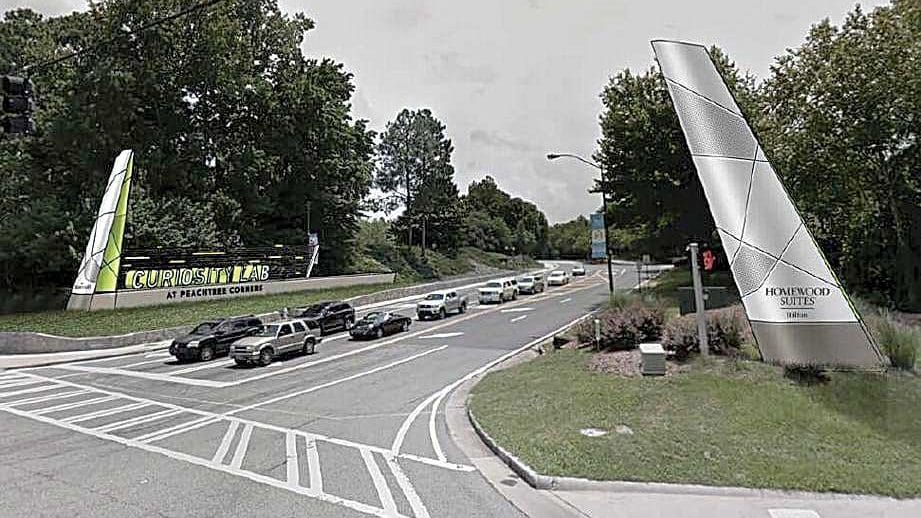
What Makes a City “Smart?”
The advancement of technology coupled with rapid urbanization continues to press for local and state governments to create better solutions for urban development. Today’s metropolises are characterized by intelligent infrastructure, early-stage investments and open communication between residents and government. Smart cities leverage data to spur progress and inform better policies and processes. Can a city as relatively new and as small as Peachtree Corners be a smart city?
Does PTC Make the Grade?
City Manager Brian Johnson revealed how Peachtree Corners is uniquely positioned to have all the “smarts!” A lean operating budget, a perk of being a young city, allows for more “discretionary funds” with which the city is able to add value back to the community.
The Corners Connect app, already up and running, can tell you the local weather, traffic, events, sales, and soon it will even guide you to the nearest open parking spaces in Town Center and The Forum. Residents can pull up the app to report problems in real-time, put in a service request and then track its status. “Providing services and communication in a more convenient way for citizens,” that makes us a smart city.
If you choose to enable it, Peachtree Corners has the ability to geofence. That means the app knows your location once you cross into the corporate city limits and it can automatically send you helpful information. Internally, the city uses this to monitor and improve its delivery of services. This makes our city “smart” too, and I haven’t even mentioned the giant screen on the Town Green yet.
The city can turn on the 22 feet wide by 12.5 feet tall NanoLumens video wall and accompanying audio system in three seconds, at the request of a resident, as we witnessed during the recent World Cup Soccer games, when one resident asking resulted in a multitude of our neighbors gathering on the Town Green with friends to watch and enjoy the big games on the big LED display. It’s a testament to Peachtree Corners’ investment in smart city infrastructure.
Yet what gets Peachtree Corners a solid A+ is the important investment it has made in Curiosity Lab at Peachtree Corners. Johnson shared, “There are direct and indirect ways smart city technology is benefiting our residents. We look to stay at the cutting edge of smart city technology in a way that [is] both responsible and cost-effective…We haven’t borrowed any money to do it. We [don’t need] to implement city property taxes to do it, it’s within our budget. But it is providing a value add…that our residents are seeing now and will continue to see in the future.”
Curiosity Lab at Peachtree Corners
In keeping with its history to develop around technology, and the city’s slogan, “Innovative & Remarkable,” very soon, visitors and residents of Peachtree Corners may feel like they’re in an episode of the Jetsons as they find themselves driving alongside autonomous cars or otherwise novel vehicles on a 1.5 mile stretch of our roads in Technology Park. The vehicles are being tested by the ground-breaking Curiosity Lab — the first autonomous vehicle and smart city living laboratory and test track of its kind in the country, featuring “not just cutting edge, but bleeding-edge technology,” as City Manager Brian Johnson describes it.
This state-of-the-art testbed for smart city technologies is attracting movement to Peachtree Corners, which is precisely what city officials had envisioned.
Johnson explained, “We’re deploying the Lab as a way to attract activity to Peachtree Corners. That activity is what’s going to keep Peachtree Corners a great community, a community that has a healthy retail/restaurant climate, stable, high property values. It’s a place where people want to come work, live, learn and play because we’re giving people reasons to come to Peachtree Corners.”
The Curiosity Lab will draw businesses from across the country interested in testing the limits of their next-generation mobility technology in a real-world, 5G and IoT environment, unlike traditional closed tracks where everything is level, predictable, controlled and confined to a parking lot-type setting. According to Betsy Plattenburg, Executive Director of Curiosity Lab, they’ve had interest from delivery and logistics companies seeking to test the delivery of food and packages in an automated fashion, using both the roadway and potentially, the sidewalk.
She also mentioned talks with some interesting drone companies, adding: “Drones can use the infrastructure and are permitted to fly as long as they’re under 400 feet.” Most importantly, Plattenburg revealed, “We are just going to be making a public announcement next week that we are partnering with the Smart City Conference.”
If Curiosity Lab was born to attract activity to the city of Peachtree Corners, one might say it has already met with great success in its infancy. We’ll soon see Fira de Barcelona — the world’s leading conference on smart cities and smart urban solutions — cross the pond and arrive on our shores for the first ever American edition of Smart City Expo World Congress, debuting in Atlanta at the Georgia World Congress Center from September 11 to 13, 2019. So how does Peachtree Corners get the spotlight in the midst of an international conference of such magnitude?
Johnson described a long-standing relationship between the Metro Atlanta Chamber and Fira de Barcelona. When Fira was looking to expand to regional conferences in Asia and North America, the Metro Atlanta Chamber welcomed the chance to make a pitch for Atlanta to host the inaugural smart cities conference in the U.S.
Having spoken in Barcelona last year, as part of the U.S. delegation there, Johnson’s pride could not be mistaken, “Smart City Expo Atlanta has recognized Peachtree Corners and the businesses that operate within our corporate limits, as being important to the greater metro Atlanta area and this conference.”
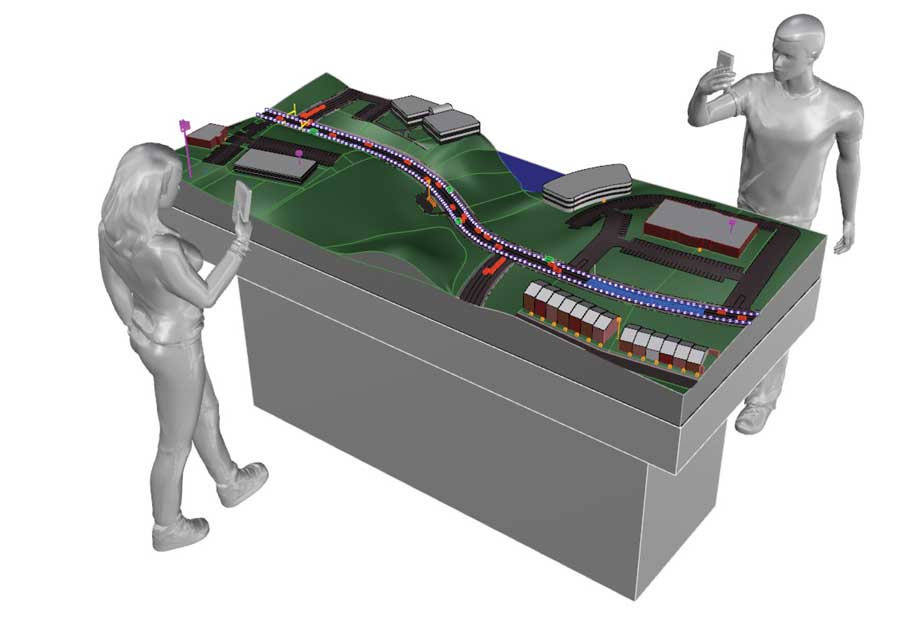
Peachtree Corners to Kick Off Smart City Expo Atlanta
Curiosity Lab at Peachtree Corners has been named the official offsite demonstration location, in addition to having an important presence in the exhibition hall at the Congress Center. On the first day of the Expo: Wednesday, Sept. 11, 10-11:30 a.m., prior to the opening events at the Georgia World Congress Center, Expo attendees who purchased tickets to the Smart City Expo and signed up to attend the demo will have been bussed to Peachtree Corners City Hall on charter buses. There, they’ll witness live demonstrations of some avant-garde technology on our test track which allows for interaction with everyday vehicular and pedestrian traffic.
A number of state dignitaries are expected to be present, as this event will coincide with the ribbon-cutting ceremony for the inauguration and grand opening of Curiosity Lab. Afterwards, charter buses will return participants to the Georgia World Congress Center in time for the opening plenary of the Expo at 1 p.m.
What to Look Out For
The demo on September 11 should be something to behold. Plattenburg and her team put out a national casting call for companies who have “proven technology that is viewable,” in the interest of making the demo on the morning of the Smart City Expo more exciting.
Plattenburg described the test track: “The outside lane will become the test lane. The inside lanes will be where human drivers drive. So, it’s almost like a regular road exists in the middle, and the testers will be on the outside. They’ll be separated by flexible bollards. The road will be painted dramatically differently on the outside lanes, and there will be excessive signage, digital and otherwise, letting you know that you’re entering a test environment. So that people driving, the human drivers, you’ll know that something is different. The test vehicles will be there.”
“That should get people off their phones!” ■
Related
Patrizia hails from Toronto, Canada where she earned an Honors B.A. in French and Italian studies at York University, and a B.Ed. at the University of Toronto. This trilingual former French teacher has called Georgia home since 1998. She and her family have enjoyed living, working and playing in Peachtree Corners since 2013.

Business
The Forum Gives Sneak Peek of New Eateries and Community Spaces
Published
2 days agoon
July 24, 2024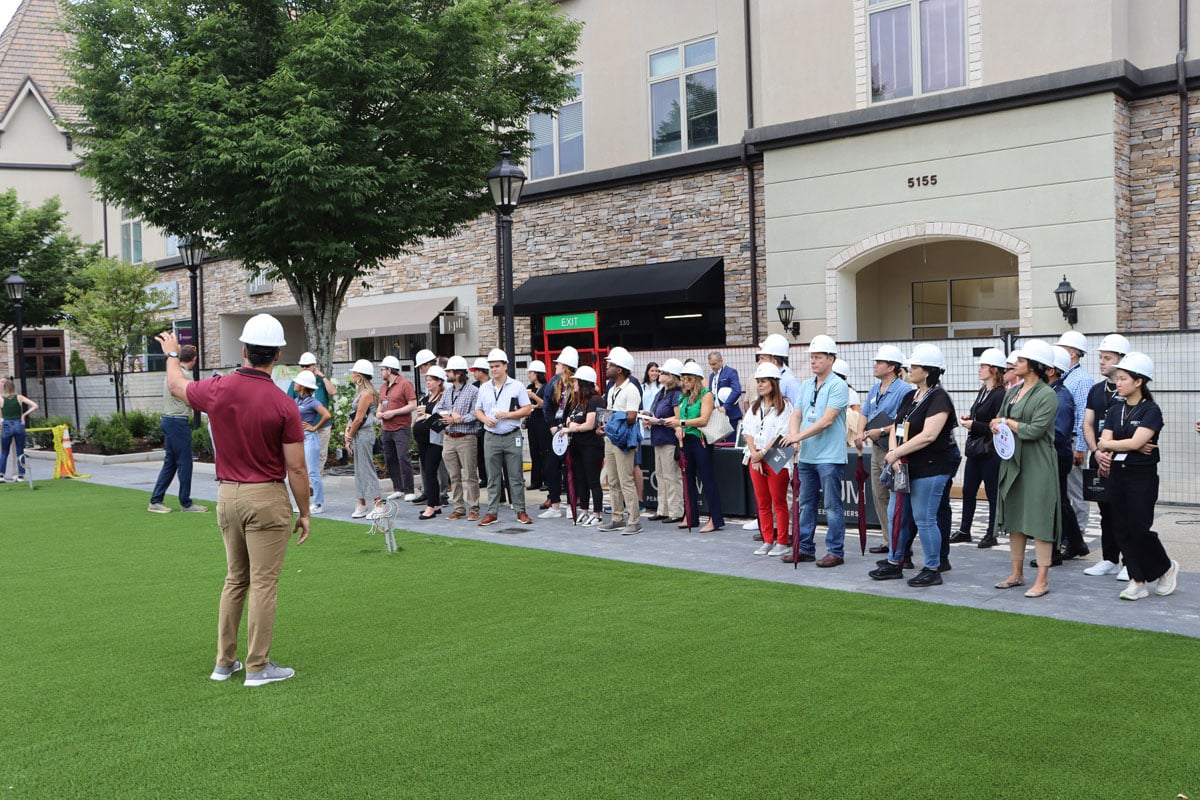
If you’ve been to or near the Forum in the past few months, you’ve probably noticed cranes and construction crews. The anticipation of the first phase of renovation of the 22-year-old retail center has left a lot of Peachtree Corners residents as well as nearby patrons excited to see changes.
The Forum administration invited the media for a hard hat tour on July 17. The event showcased the redevelopment progress ahead of The Plaza’s grand opening on Aug. 8.
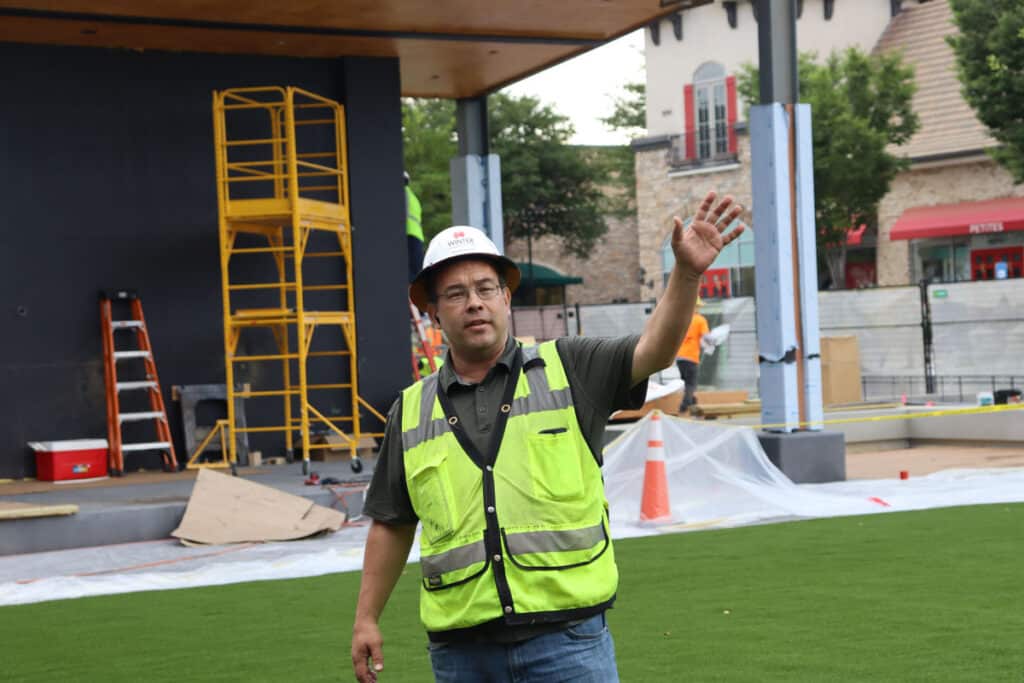
Scrumptious bites incoming
Executives from the development and leasing teams joined on-site management and led attendees around the new central gathering space, guest amenities and Politan Row, the newly created 10,000-square-foot food hall.
Dining concepts from veterans at Sheesh, Twenty-Six Thai and newbie Gekko Kitchen were the first food vendors announced for the space, which is expected to open in January.
“We can’t wait to introduce the Peachtree Corners community to our food hall experience,” said Politan Group CEO Will Donaldson in a news release. “Every detail from the design to the bar program to the cuisine is thoughtfully curated to inspire guests to not only mingle with one another but to connect with our incredible restaurateurs and discover new favorites.”
During the tour, Donaldson explained that eventually there will be seven different global cuisines in the Politan Row food court at the Forum featuring well-known and up-and-coming local talent. Once complete there will be a central bar, a private event venue and a covered outdoor patio.
“One of the things that we’re excited about is this unique design that we’ve come up with, that’s very specific to this area,” he said. “We’ll be open seven days a week for lunch and dinner. Whether you’re with a group for lunch or with your family, it works great for multiple settings.”
Twenty-six Thai owner Niki Pattharakositkul said the restaurant will work with local vendors to source the freshest meats and produce possible.
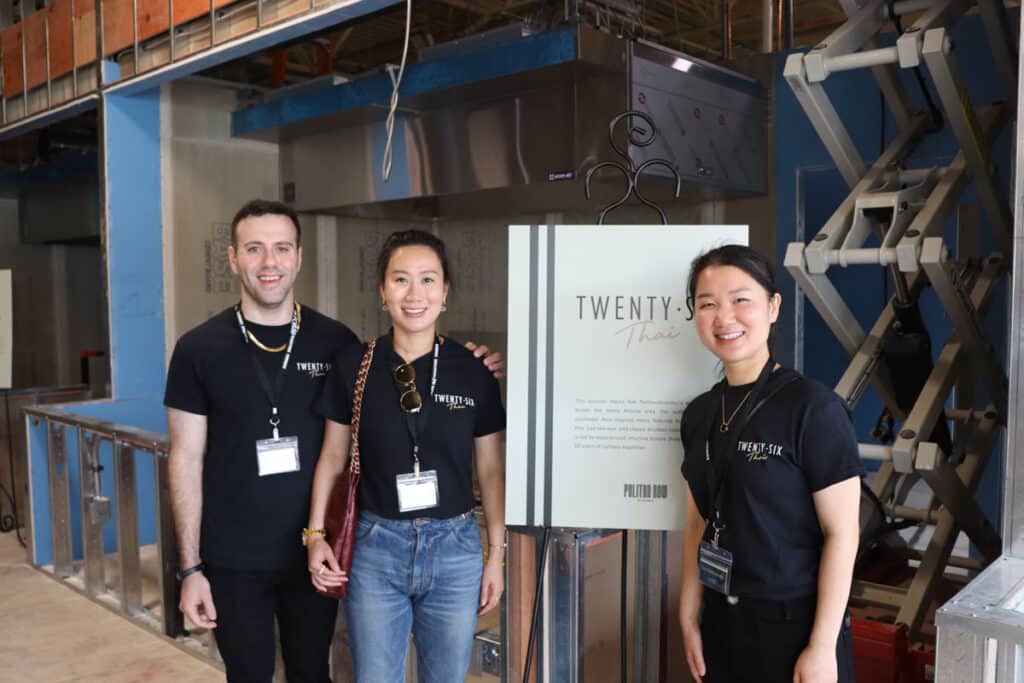
“There are certain types of produce and protein we try to source locally, but sauces and the more exotic produce and herbs, we have to import from Thailand,” she said. “Our brand is trying to move towards doing things locally and sustainably.”
Working with organizations such as Georgia Grown limits the use of large food distribution companies. Since starting Twenty-six Thai in 2016, Pattharakositkul has launched seven locations across metro Atlanta, including at Politan Row’s Ashford Lane and Colony Square.
The eatery describes itself as an “authentic wok-fired Southeast Asia-inspired menu featuring items such as pad Thai, pad see ewe and classic drunken noodles.”
Sheesh, a Mediterranean concept that uses simple, wholesome ingredients prepared with unique spices and blends, is run by corporate executive chef Charlie Sunyapong and director of operations Raquel Stalcup. The two are also members of the group behind full-service restaurants Stäge at Town Center and Pêche at the Forum.
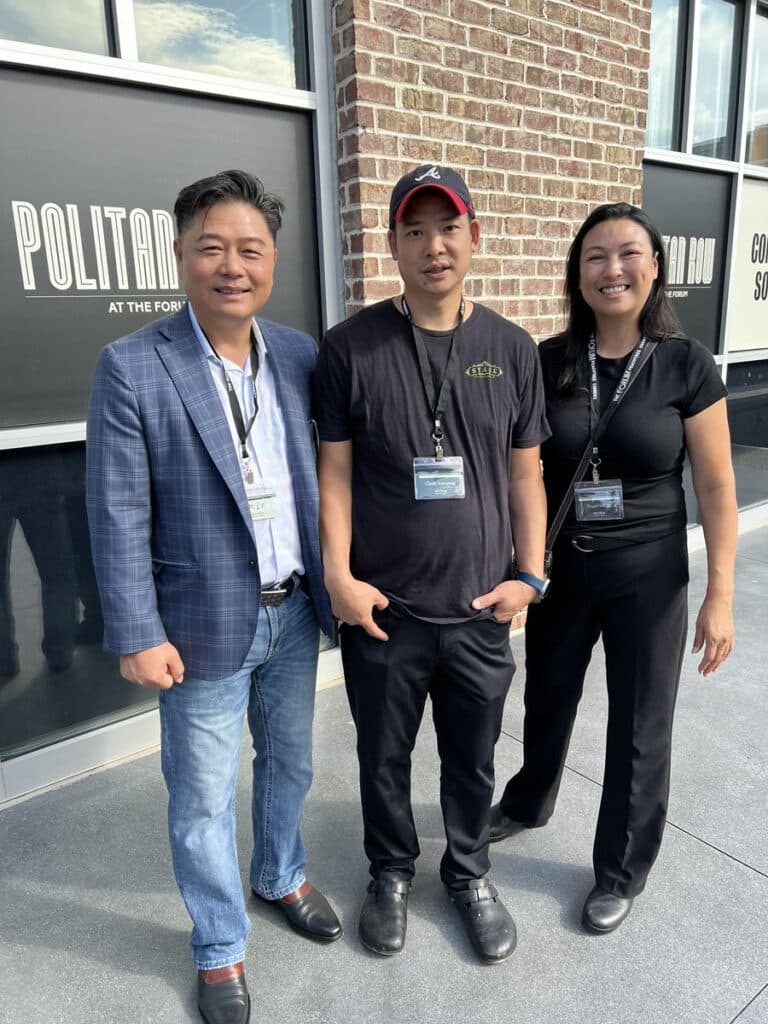
The popularity of those suburban concepts has already taken off. With Sheesh, they’re looking to do something different.
“There are going to be some things that are unique to Sheesh that you’re not going to get at the other places,” said Sunyapong. “You’re not getting a whole restaurant; this is quicker fare.”
Gekko Kitchen, a former food truck transformed into a hibachi and ramen experience, will be serving fresh, fast bowls that are more colorful and lighter than traditional hibachi fare.
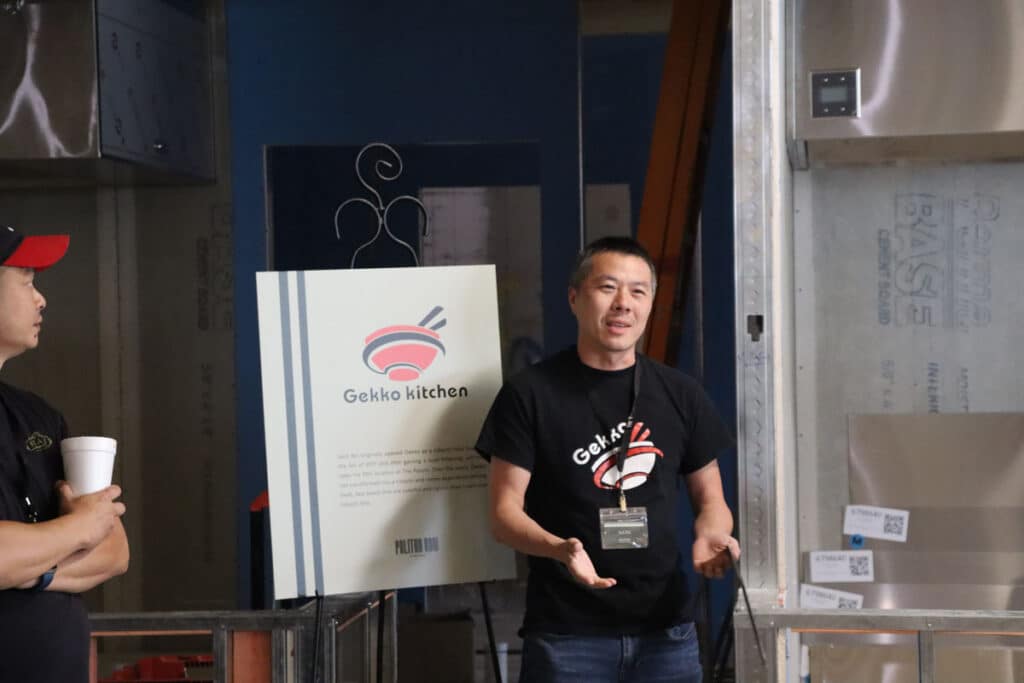
Gathering spots
Development Manager Nick Lombardo explained that NAP is moving away from building big construction projects from scratch like Colony Square in Midtown Atlanta and Avalon in Alpharetta.
“As a company, North American Properties pivoted around 2020 from building big ground-up construction to more redevelopment with already existing properties,” he said. “With the thought of great assets that just need a little more attention Infused into them to create value, we bought the Forum in 2022.”
He said that value-add propositions done at The Forum will create a more walkable center.
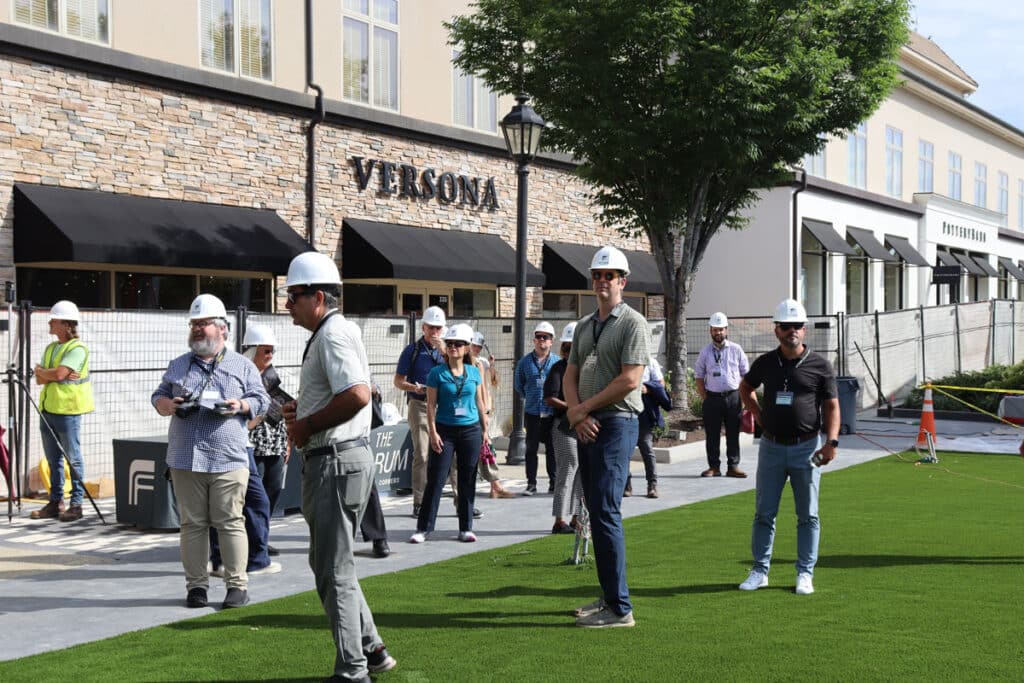
“Trying to compete with the internet on convenience is a very tough task, so the way we differentiate is by experiences,” he said. “We host between 150 to 200 events every year. We have things like concerts, wellness and fitness events and we have child playtime events. Our marketing team does a great job and they’re the differentiator when it comes to what makes our property stand out.”
By the first week of August, a large gathering space will be unveiled in the central area of the property between Pottery Barn and seafood restaurant Pêche. It will have a nine-foot LED screen capable of hosting movie nights and sports viewing. There will also be musical performances featuring local artists.
“We’re not in competition with Town Center,” said Charlotte Hinton, marketing manager at The Forum. “Town Center has gates like a real music festival and we’re more like a ‘chill and enjoy the music’ vibe where you can grab a beer and hang out or maybe kind of walk around.”
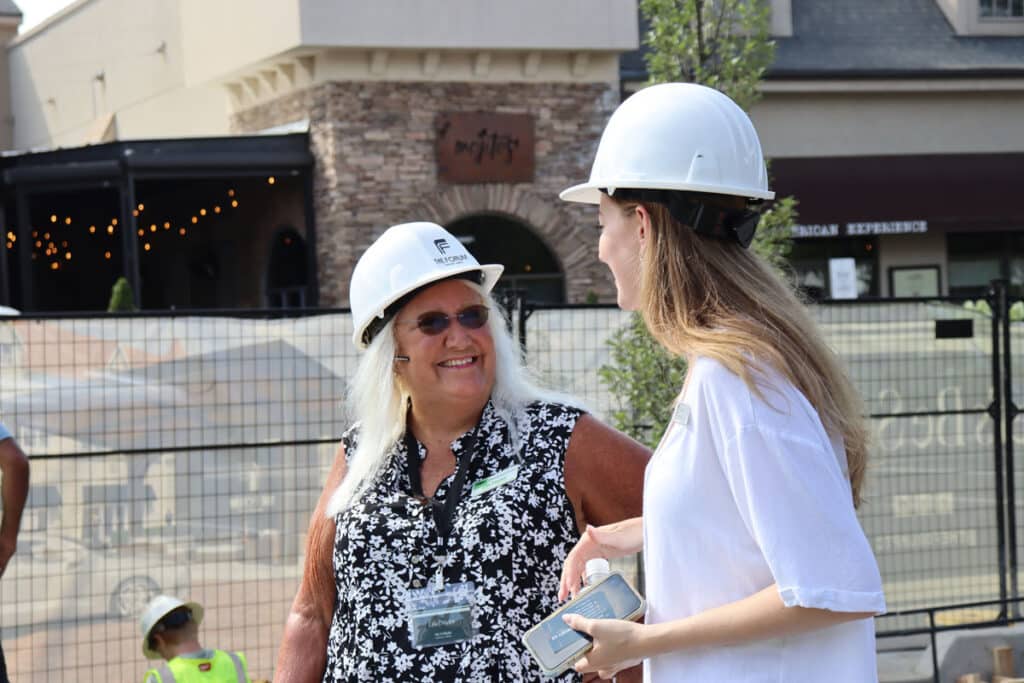
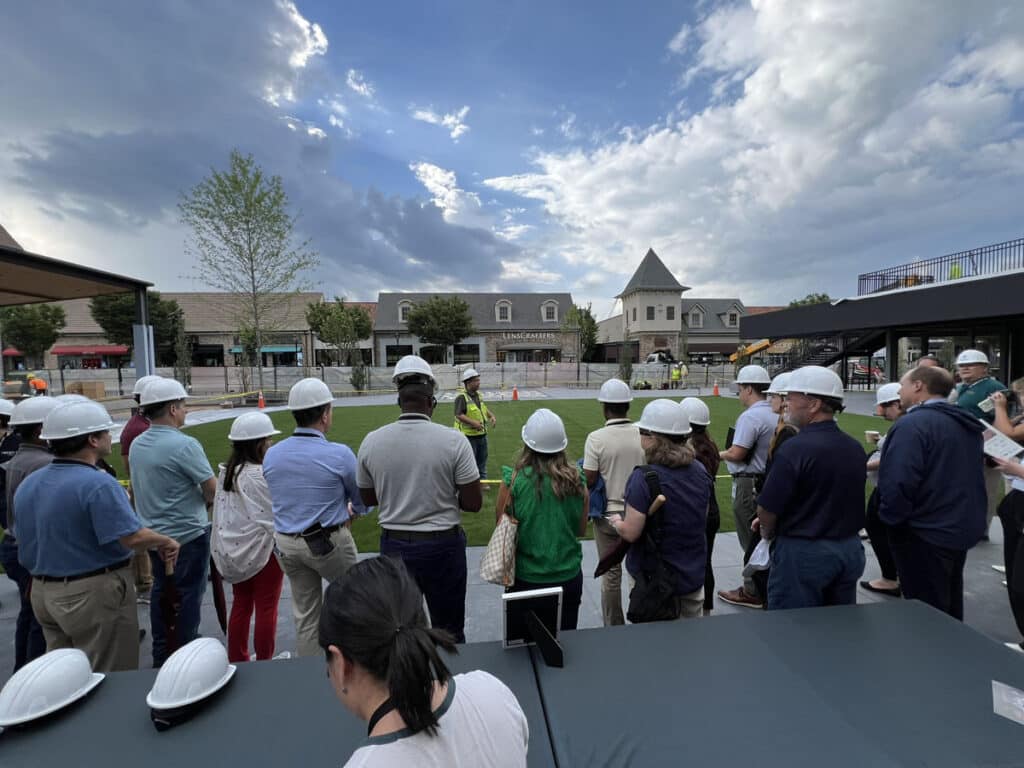
The smaller space and artificial turf are unlike the Town Center space where attendees spread blankets and bring chairs. The Forum will have furniture and seating in the space so folks can just gather and either enjoy time with family or partake in events.
The Forum will also offer valet parking on a limited schedule at that end of the property.
More improvements
Although the construction equipment will have moved out, the jewel box building will house a yet-to-be-named restaurant that will open early next year.
“We’re pretty much done with what we’re doing as far as landlord work,” said Lombardo. “We ask our tenants to bring their brand and their design and their material pallet and put that on the building to express their brand identity. They know their brand better than we do. They know how to best design their building and how it functions and works.”
It’s the same process with retail stores, he added.

“We always ask all of our new tenants to come in here when they’re building their storefront,” he said. “They’re not just selling their clothes; they’re selling a lifestyle in the brand so we ask them to push their brand out to the street.”
Even with the new spaces, there will be no shortage of parking, Lombardo added. “There’s plenty of parking behind these buildings,” he said pointing toward Pêche. “What we’ve done is enhance the connectivity to those areas. We’ve redone this breezeway and we’re adding lighting and connecting the parking lot to the main boulevard here. The goal is to replace cars with people and activity and bring a sense of community to the property.”
Related
Business
Taste of Peachtree Corners: PCBA Showcases Local Restaurants
Published
1 week agoon
July 17, 2024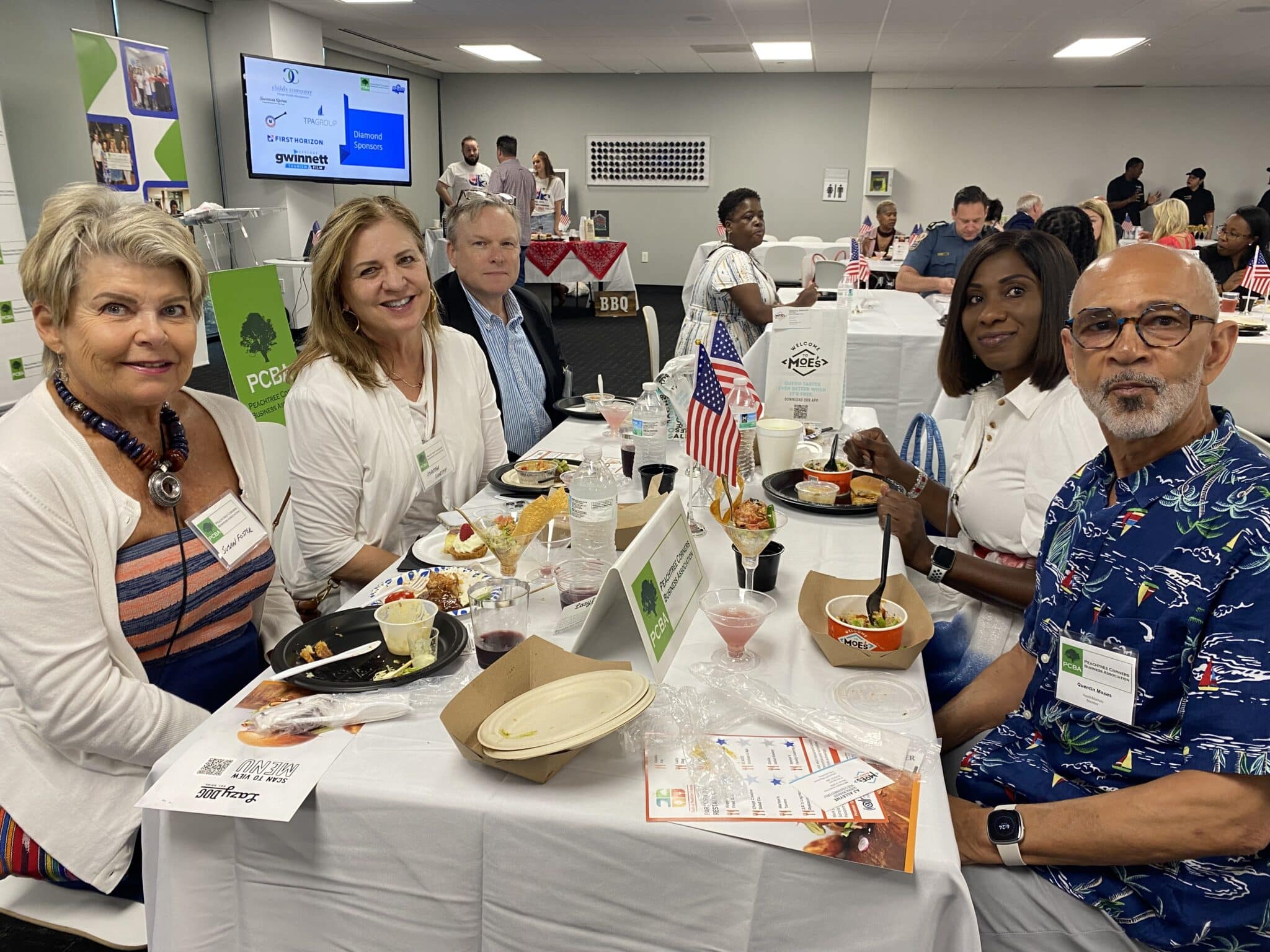
The Taste of Peachtree Corners has been in the works for years, but the COVID-19 pandemic put many key events on hold for the Peachtree Corners Business Association (PCBA).
But luckily this year, the dedicated staff of volunteers successfully executed a memorable event and introduced a lot of local business owners to their neighboring restaurants and caterers.
As I walked up to the Community Chest Room at Peachtree Corners City Hall on June 27, there was a line outside the door. I later found out that over 100 people had registered to attend the event. I got checked in quickly and was faced with a “passport” of 10 Peachtree Corners restaurants serving everything from high-end bakery items to good old-fashioned barbecue, and modern twists on seafood and American cuisines.
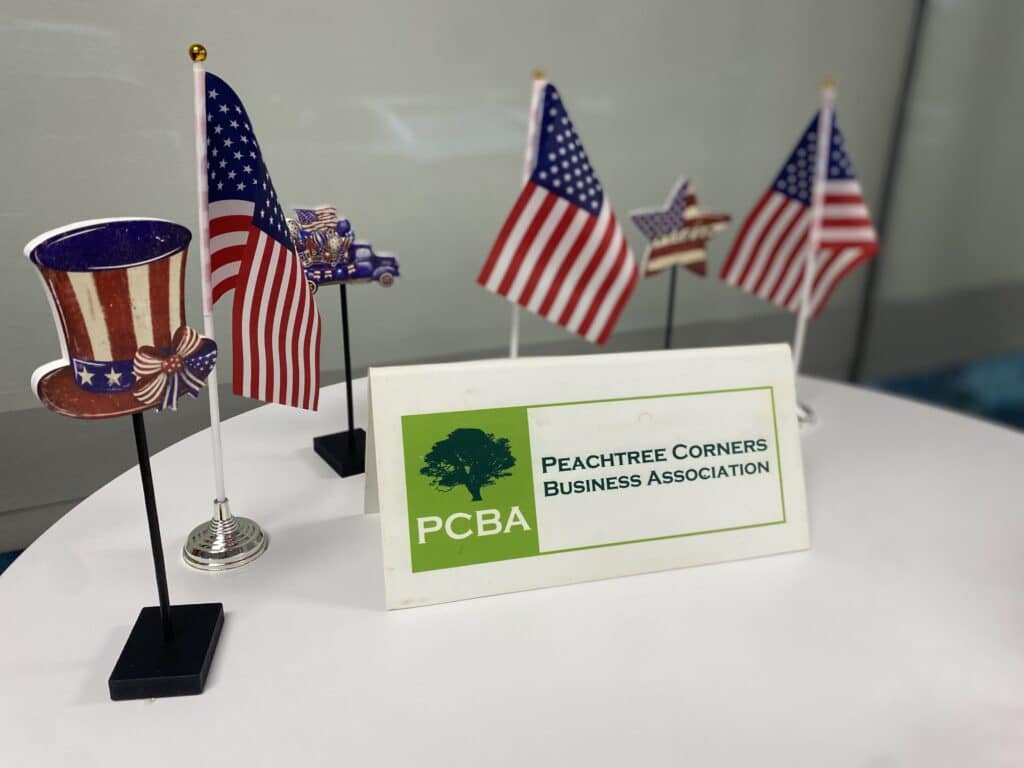
Let’s talk about the food
The idea was to visit all 10 restaurants and collect stars while trying samples and small plates. My first stop was Firebirds Wood Fired Grill, and they had my favorite – homemade chips and queso. The queso was smoky and mildly spicy with a great depth of flavor. What a great start. Next up was Chopt. Creative Salad Co. I had never heard of this restaurant before, but they blew me away with a perfect amuse-bouche of cherry tomato, pesto, mozzarella, and olive oil. These guys understand simple and fresh Mediterranean flavors.
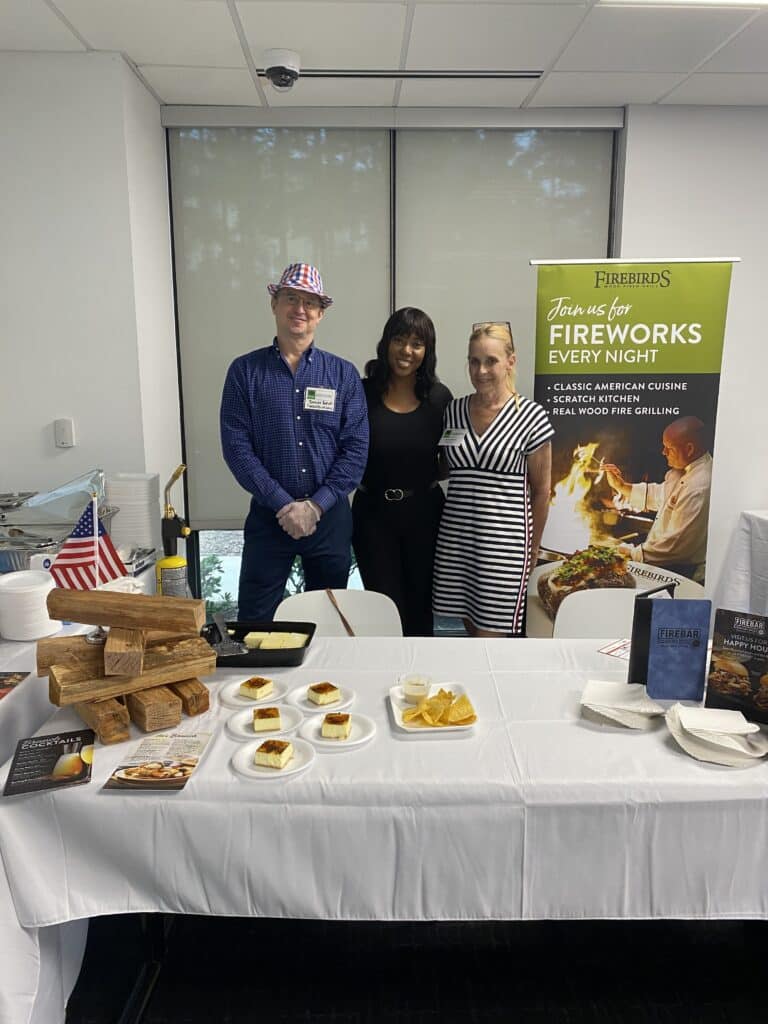
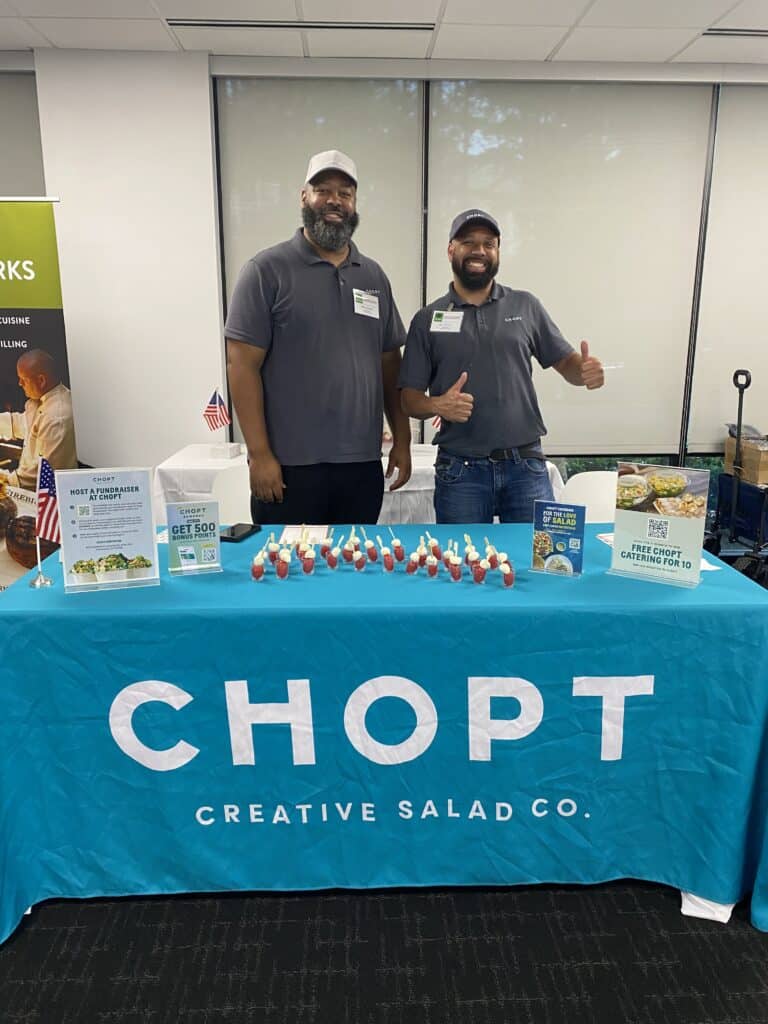

The folks from Marlow’s Tavern were also on-site serving shrimp and grits with jalapeno, spinach and tomato beurre blanc. This is definitely the style of elevated food I’ve come to expect from Marlow’s. And as a nice touch, they prepared a refreshing blueberry cocktail.
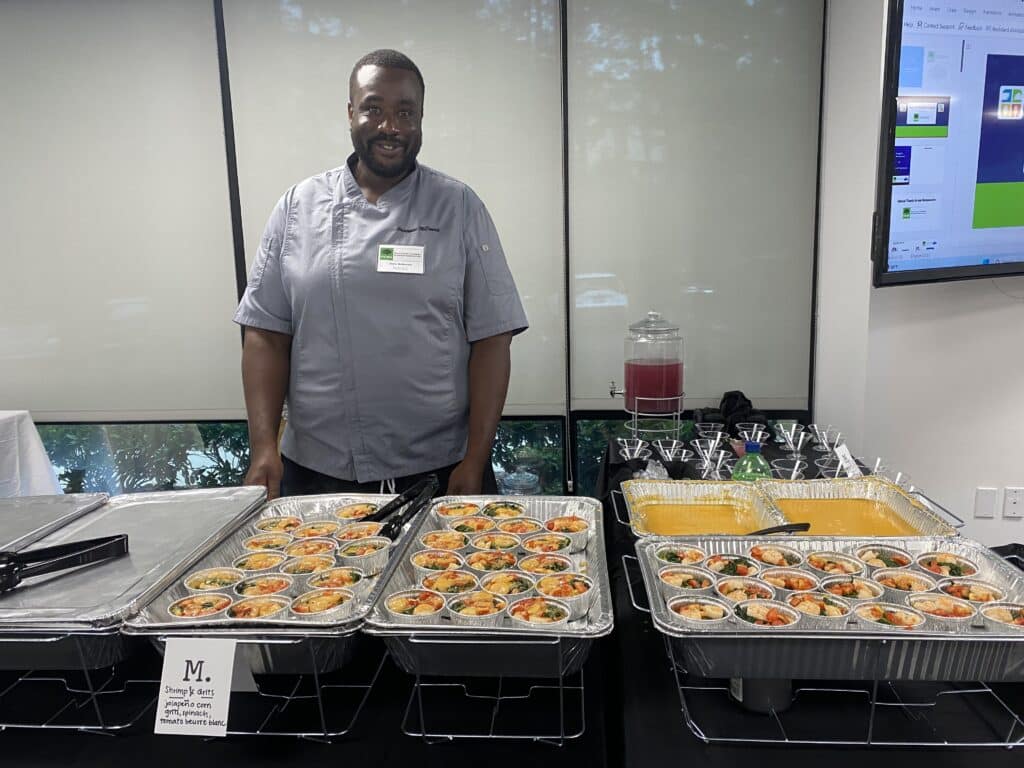

Another familiar face was set up on the other side of the room. J.R.’s Log House Restaurant served southern favorites like pulled pork sliders, baked beans and mac n’ cheese. I couldn’t pass this one up. The pulled pork was tender, tangy and saucy. Exactly what I want from a barbecue. Lazy Dog’s table really impressed me with its presentation. The tuna cup with rice, avocado and chili with chips on the side, was a real stunner.
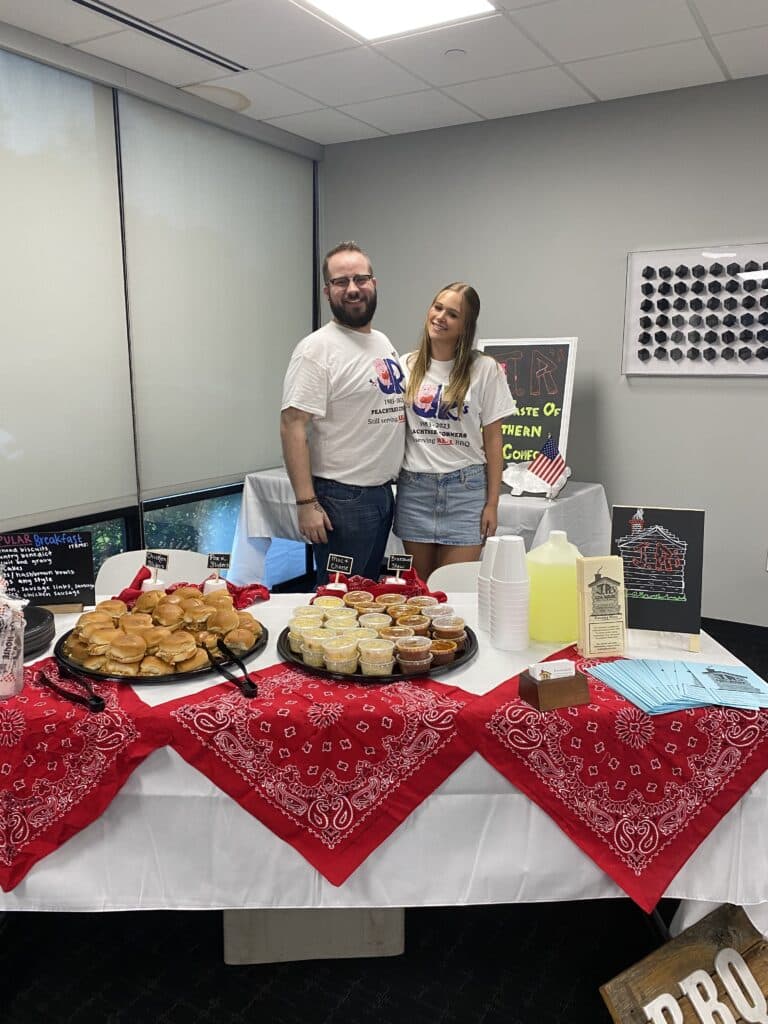
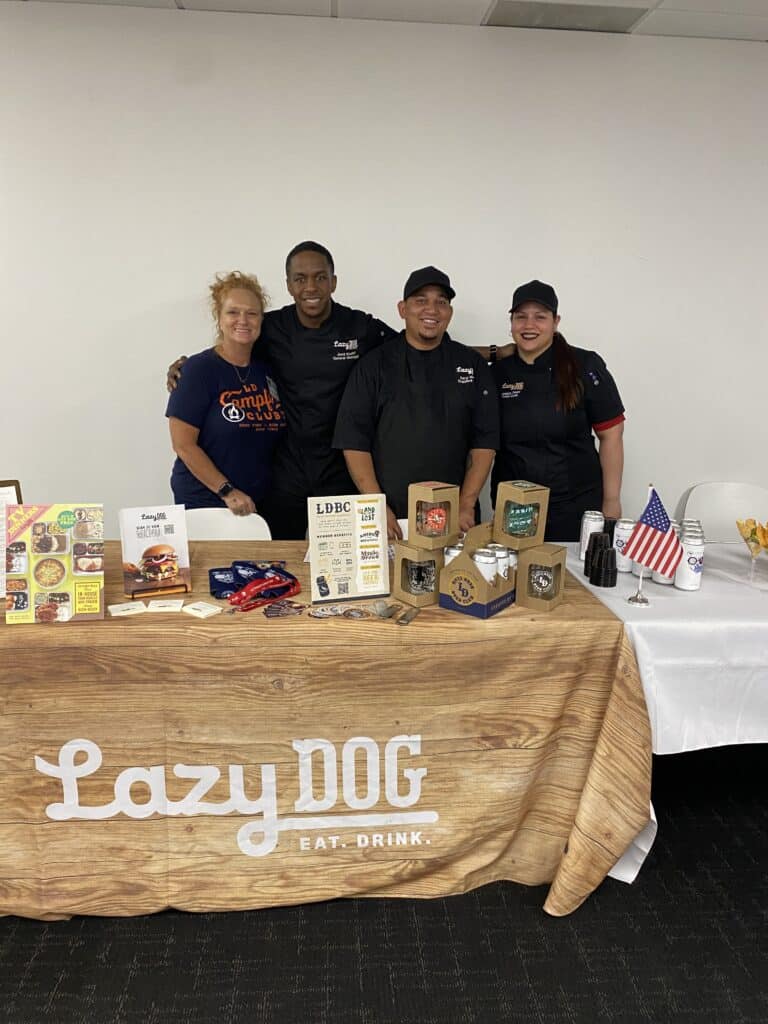

Moe’s Southwest Grill was also on-site handing out tasty tequila lime chicken with rice, avocado, and black beans. This super hearty and comforting entrée was followed by a seafood course from PECHE Modern Coastal. Crab cakes with a croissant pinwheel, roasted garlic and lemon aioli and arugula were on the menu and the flavor combinations were simply fantastic.
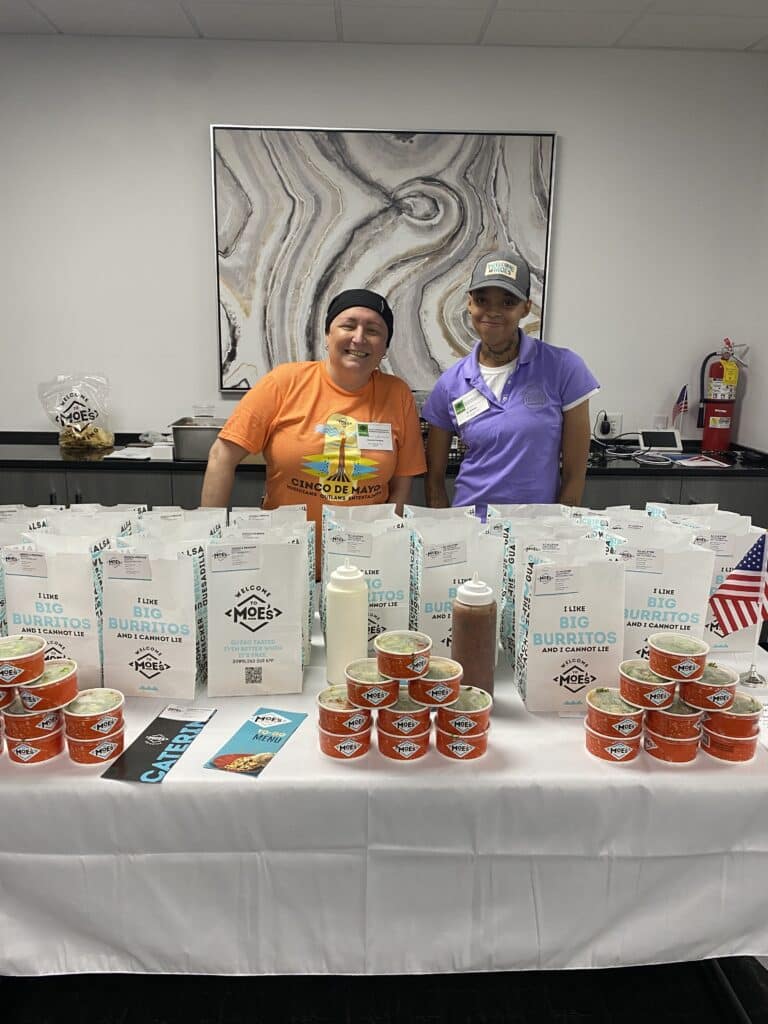

PECHE’s sister restaurant STAGE Kitchen & Bar was next door offering a tuna and salmon tostada with avocado, eel sauce, spicy mayo, and cilantro. This was easily one of my favorite bites of the night. The tostada was crunchy and light with clean and bright flavors. No kidding, I could probably eat this every day for lunch.
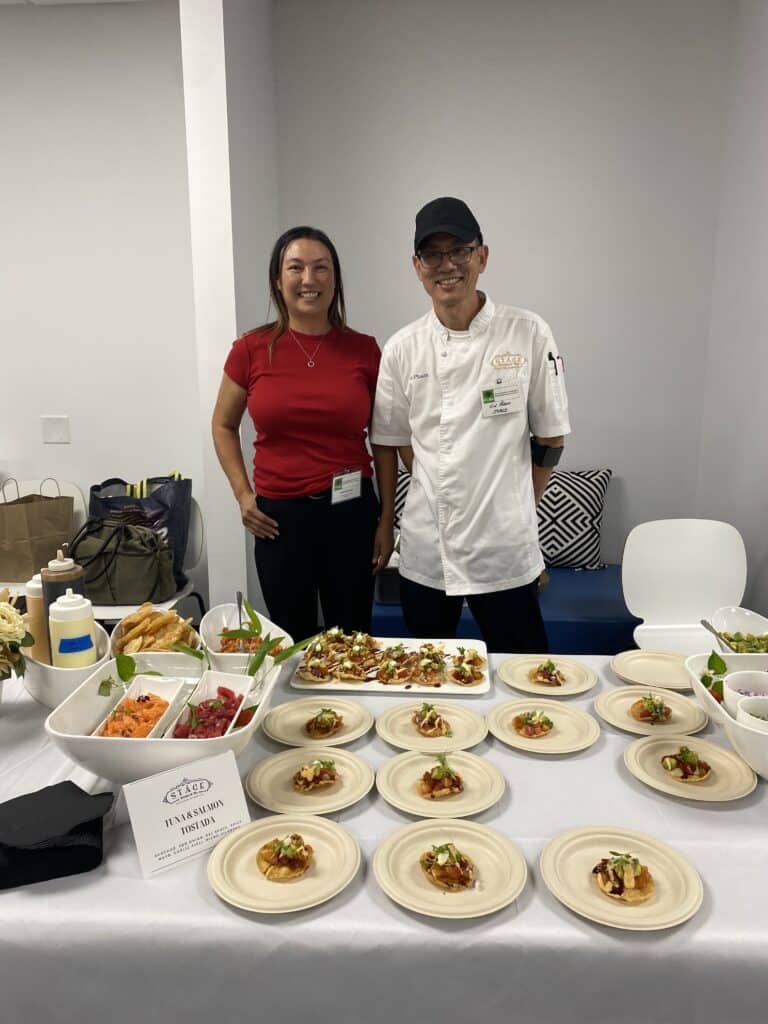

I moved on the Smoke’s Family Catering and owner Phillip Smoke had whipped up enough barbecue to feed an army. I had the pleasure of trying the smoked chicken with potato salad and it was the perfect pairing. Last but not least: dessert. I capped off the evening with a beautiful chocolate ganache-filled croissant with perfect lamination and flaky texture.

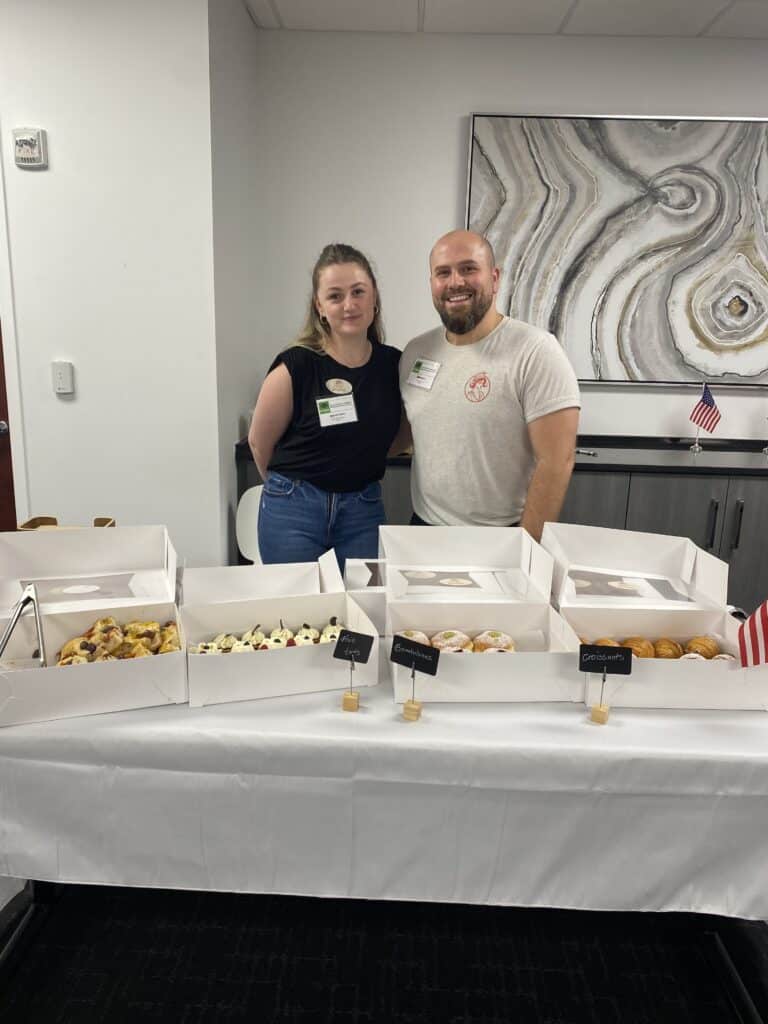

The inspiration behind the event
With a (very) full stomach, I caught up with PCBA President Lisa Proctor to talk about the event.
“We knew that COVID was really hard on a lot of our restaurants to get people back in,” said Proctor. “We wanted to do it in June because we wanted to celebrate our military. Everybody remembers them maybe on Memorial Day or different things, but June is the 80th anniversary of D-Day.”
“The military is always close to our heart,” she added. “We’re also very proud of our restaurants. They all have gone above and beyond.”
Tonight, the PCBA was honoring the Armed Forces and its brave veterans while bestowing two donation checks to very worthy causes.
The first check for $500 went to Folds of Honor. Since 2007, Folds of Honor has provided life-changing scholarships to the spouses and children of America’s fallen or disabled military. And now, their mission expands to the families of America’s first responders.
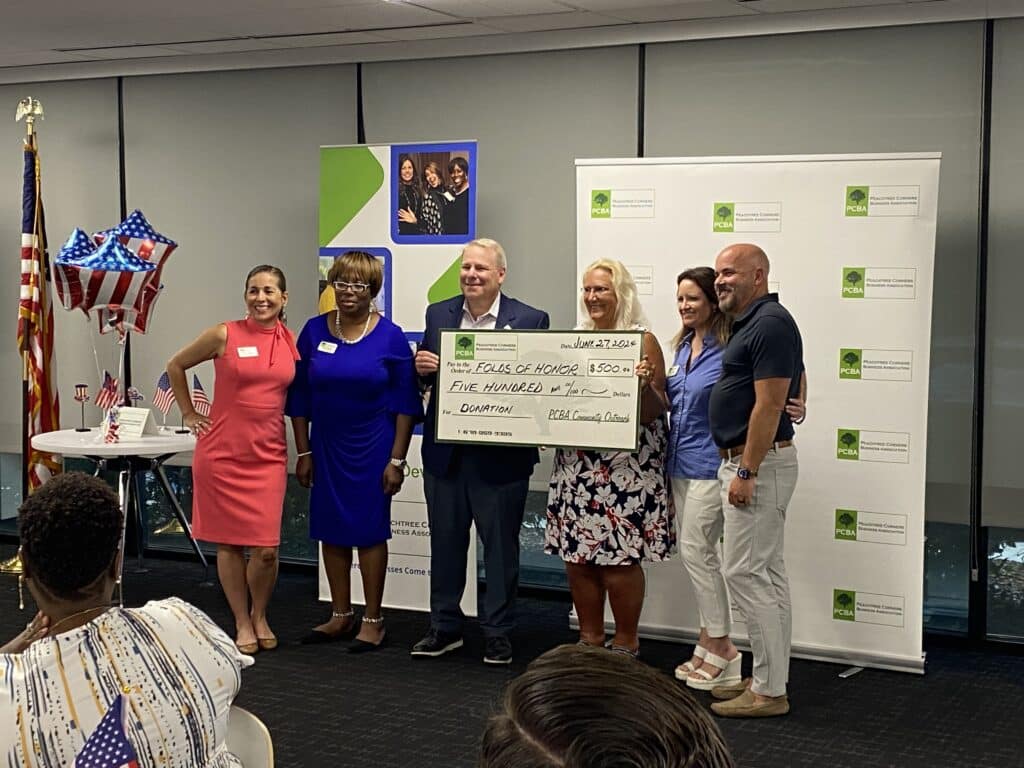
The second check for $500 was given to Light Up the Corners, a 501(c)(3) volunteer organization with an annual glowing, flashing, blinking, shining, nighttime running party and fundraiser in one. All proceeds from the event go to benefit less fortunate children and families in the Peachtree Corners community who are struggling by giving them the chance to participate in life-enhancing programs and activities at the Fowler YMCA.

Over the past 12 years, the PCBA has awarded 19 scholarships and donated more than $156,000+ back to the Peachtree Corners community.
Related
Business
Local Resident Opens AtWork Location in Peachtree Corners
Published
2 weeks agoon
July 10, 2024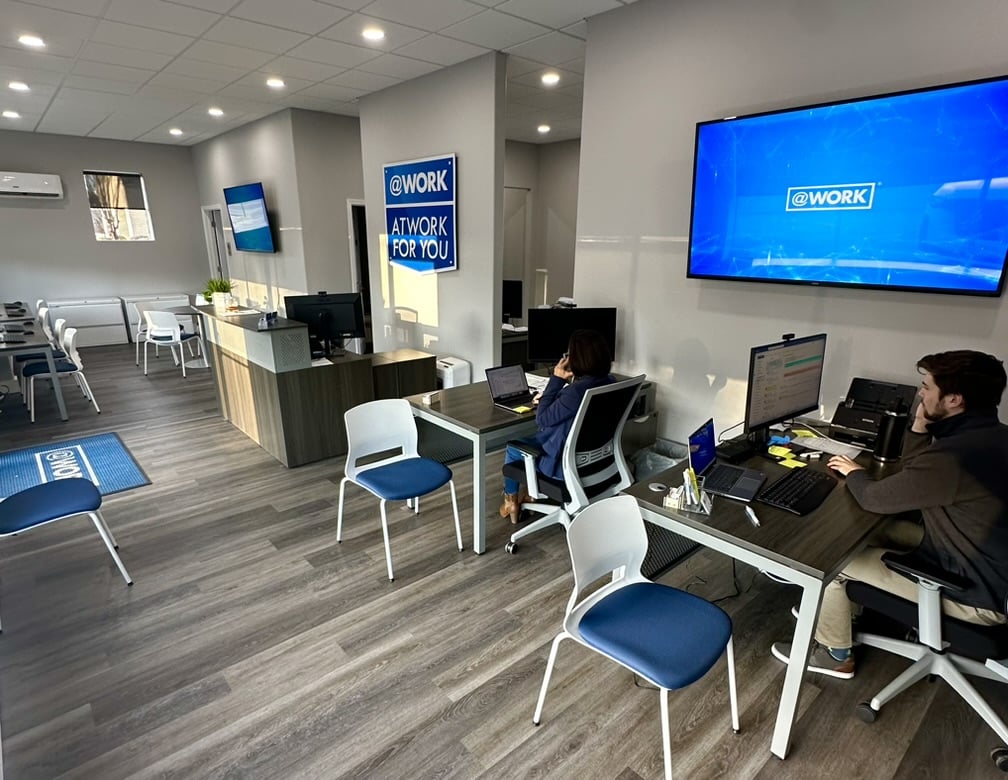
AtWork, one of nation’s leading staffing franchises, has opened its third Metro Atlanta location in Peachtree Corners, Georgia at 6185 Buford Highway, Suite E-100.
AtWork Peachtree Corners is locally-owned by Kamal Bhatia, an immigrant from India with decades of experience in hospitality and as the Senior Vice President of Operations of Atlanta-based Action Bartending School.
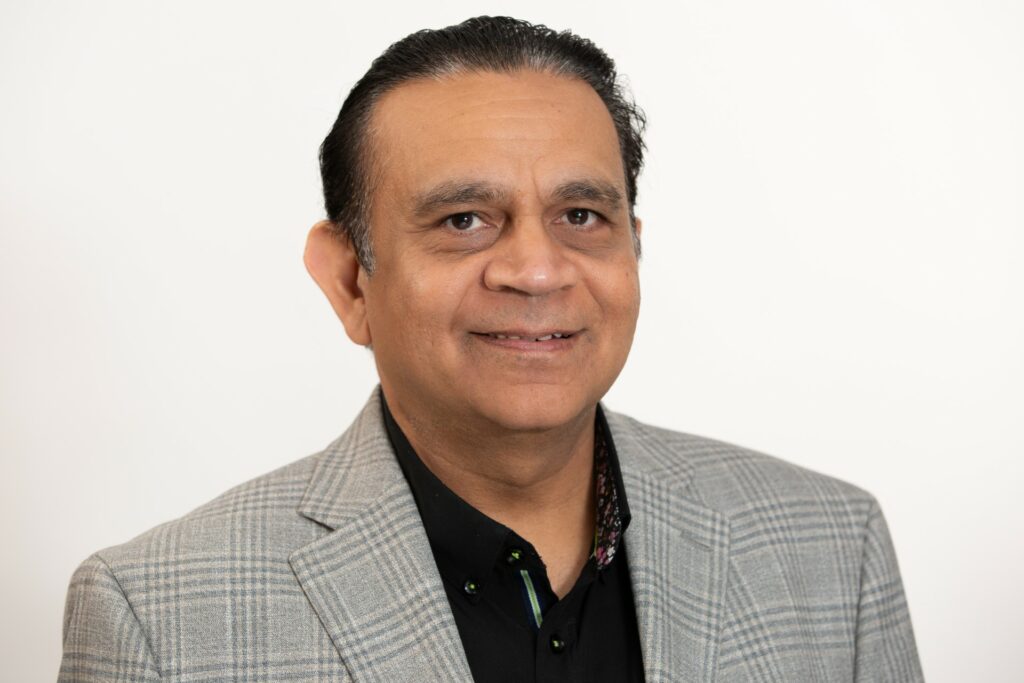
“There is an incredible need for AtWork’s services in Peachtree Corners,” said Bhatia. “Since migrating here in 1996, I’ve witnessed Atlanta evolve and sprout new communities north of the city, including my own. Peachtree Corners has become a hub for thriving businesses, and my goal with this location is to be a key resource between companies and job seekers to support the continued growth of our local economy.”
Bhatia’s son and daughter will assist him in the business.
“This is an opportunity to create a legacy company to ensure our community is supported for generations to come,” he said.
For more than three decades, AtWork’s mission has been to connect people with jobs and jobs with people. With more than 100 locations nationwide, AtWork puts nearly 40,000 individuals to work each year in administrative, light-industrial, accounting and finance, hospitality, IT and management-level positions at some of the nation’s largest and most recognizable companies.
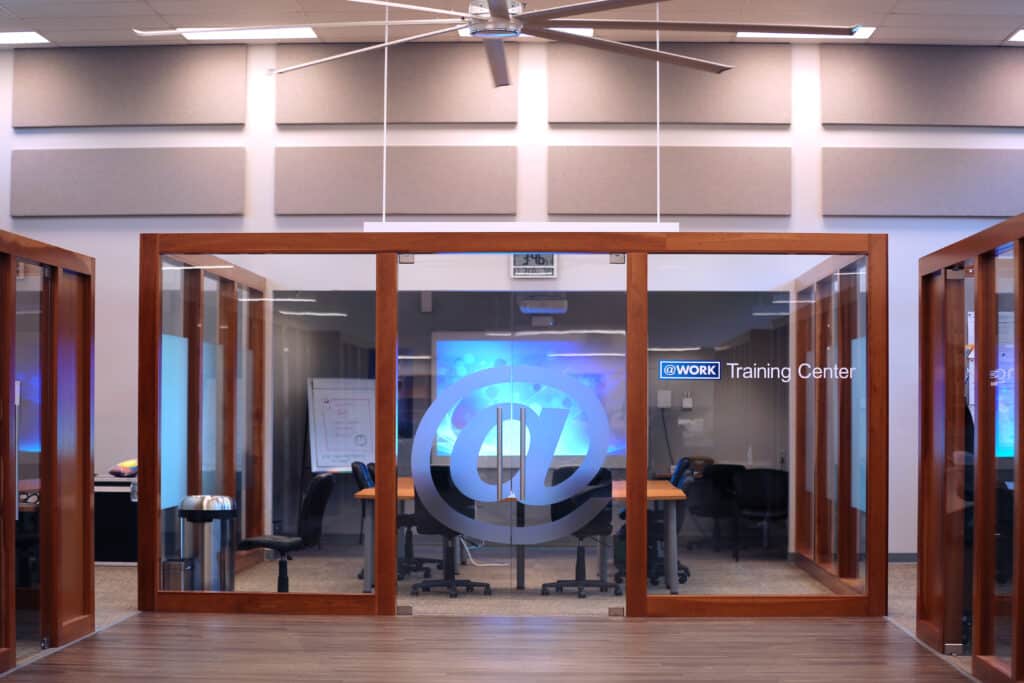
“We’re proud to open our doors in Peachtree Corners and provide a common place for both job seekers and growing businesses to turn for staffing solutions,” said Jason Leverant, President and COO of AtWork.
“AtWork will serve as a key resource to help employees thrive, businesses prosper and communities flourish. Kamal is the perfect partner to champion our mission and be a servant leader in her local community,” he added.
Related
Read the Digital Edition
Subscribe
Keep Up With Peachtree Corners News
Join our mailing list to receive the latest news and updates from our team.
You have Successfully Subscribed!

What’s going on at Jones Bridge Park and the Challenges of Urban Development

Taste of Peachtree Corners: PCBA Showcases Local Restaurants

The Forum Gives Sneak Peek of New Eateries and Community Spaces

Southwest Gwinnett Mayors Share Visions for the Future

8 Events Happening In and Around Peachtree Corners This August

Peachtree Corners Shines Bright with Light Up the Corners Glow Race this August

Peachtree Corners Shines Bright with Light Up the Corners Glow Race this August

The Forum Gives Sneak Peek of New Eateries and Community Spaces

8 Events Happening In and Around Peachtree Corners This August

Southwest Gwinnett Mayors Share Visions for the Future

Taste of Peachtree Corners: PCBA Showcases Local Restaurants

What’s going on at Jones Bridge Park and the Challenges of Urban Development

Local Resident Opens AtWork Location in Peachtree Corners

CHRIS 180 Expands its Services into Gwinnett County [Podcast]

Light up the Corners [Video]

Capitalist Sage: Business Leadership in Your Community [Podcast]

Cliff Bramble: A Culinary Adventure through Italy

Top 10 Brunch Places in Gwinnett County

A Hunger for Hospitality

THE CORNERS EPISODE 3 – BLAXICAN PART 1

Top 10 Indoor Things To Do This Winter

The ED Hour: What it takes to Remove Barriers from Education
Peachtree Corners Life
Topics and Categories
Trending
-
Business1 week ago
Taste of Peachtree Corners: PCBA Showcases Local Restaurants
-
Business2 days ago
The Forum Gives Sneak Peek of New Eateries and Community Spaces
-
City Government4 days ago
Southwest Gwinnett Mayors Share Visions for the Future
-
Around Atlanta4 days ago
8 Events Happening In and Around Peachtree Corners This August






